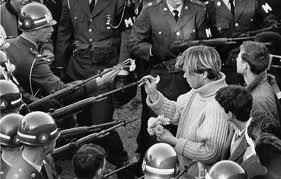Joseph Heller’s importance to the canon of the American war novel comes from his utilization of deliberate absurdity and dark satire in Catch-22 to expose the plight of the post-modern soldier in his fight against the dehumanizing military bureaucracy that entraps him. Heller’s wholesale re-evaluation of the system places him within the “great American tradition of dissent,” though as Sanford Pinkster notes, “he extends it by changing the essential arithmetic that once came with the war novel” (Pinkster). Instead of a youthful romantic hero found in the war novels of Hemingway and others before him, Heller introduces Yossarian, whose sense of obsessive self-preservation overrides any sense of traditional duty or honor in his quest to survive the corrupt entrapments of the absurd system on Pianosa. In addition to Heller’s redefinition of the American war novel protagonist, Catch-22 makes a place for itself within the canon through its prevalent use of absurdity, both as a theme and as literary mode. In the words of James Webb, a veteran, who first read the novel when stationed in Vietnam, “Heller’s novelistic choice of absurdity over irony was the most effective way to make a point without demeaning true sacrifice or insulting our national goals” (Webb). Webb’s insight into the effectiveness of the absurdity in Catch-22 in expressing the sentiments of the post-modern soldier provides a fitting summary of the importance and relevance that Yossarian’s non-chronological journey holds as a pioneer novel during the rise of the counterculture. The anti-establishment ideas presented in Yossarian’s struggle against the absurd horrors of war and also the corrupt military bureaucracy that enforces them would become the framework for the anti-war protests of the counterculture because of the relevance and validity of its satirical critique. Furthermore, the application of the novel’s ideas extends past the institutions of warfare. The fight of the depreciated post-modern individual against the unflinching, corrupted societal machine encompassed all aspects of American life. Some readers may try to project a final resolution from Heller onto the narrative condemning war as bad, but as Webb keenly observes, “His message was not that his war or mine was either good or bad. It was that all wars dehumanize” (Webb).
CONTINUE: Analysis of Absurdity and Corruption
BACK—> to the TITLE PAGE



I find it particularly interesting that in this analysis you compare Heller’s “war-hero” to that of Hemingway. You say, “Instead of a youthful romantic hero found in the war novels of Hemingway and others before him..”. I say that this is interesting because though there is certainly a difference between Yossarian in Catch 22 and Jake in Hemingway’s The Sun Also Rises, I don’t know that I would describe Hemingway’s “hero” as romantic. In fact, I find that Jake is about as far from romantic and the conventional war hero as you can get. The entire novel is about Jake’s impotence from his war wound, which creates the irony in his relationship with Brett. Though she continuously tells him she loves him, she refuses to be with him because their relationship would never go past platonic. Instead, Jake arranges for Brett to be with Pedro, which seems to substitute the sexual relationship they can never have by allowing her to have one with another man. Aside from this, Jake does not talk about the war, except for very briefly, and certainly does not romanticize it. Instead, I would say that The Sun Also Rises is much closer to an anti-war novel, like Catch 22, than you’ve implied. With this said, I very much appreciate the quote you’ve used here by Webb, as I think it better describes the difference between Heller’s war hero and Hemingway’s. He is quoted as saying, “Heller’s novelistic choice of absurdity over irony was the most effective way to make a point without demeaning true sacrifice or insulting our national goals” (Webb). I feel that this is a more accurate way to understand Heller’s approach to to the topic of war, rather than comparing it to the “romantic”. The entirety of the novel, Catch 22, is simply absurd. Not only the characters, and of course Yossarian himself, but the “plot” of the novel as well (if you could call it that, the story doesn’t really follow a traditional “plot” line). I think it may have been better stated to say that while Hemingway paints an anti-war picture in his novel through the use of irony and the absence of talk about war, Heller approaches this very differently by crafting a picture which depicts war as almost humorous, and definitely unnecessary.
None of my reference to Hemingway’s war hero has anything to do with Jake in “The Sun Also Rises” since it is not a part of the war novel canon that my project deals with. Though Jake’s character and attitude is no doubt affected by his injury during the war, the story, itself, has very little to do with war and even less with warfare. I’m talking about “For Whom the Bell Tolls” specifically with Hemingway. Certainly, if I were to propose that Jake was a “romantic” hero, or any type of “war hero” at all (relative to Yossarian and others), I would be totally wrong. I’m sorry if there was a part of my project that made you think I was talking about “The Sun Also Rises” specifically with Hemingway, but it doesn’t really fit with the argument or canon that I’m concerned with in this project.
Thanks, for your response and interpretation! “The Sun Also Rises” is one of my favorite Hemingway novels and your analysis of it is pretty accurate. It also provides an interesting connection to Jake and Yossarian that is certainly worth noting because the connection is much closer than that of the hero in “For Whom the Bell Tolls,” and I think this supports my argument that the themes in Catch-22 have as much significance to the postmodern society as they do with warfare.